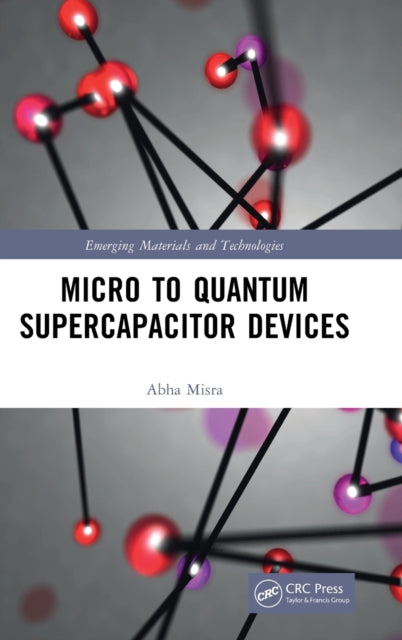AbhaMisra
Micro to Quantum Supercapacitor Devices
Micro to Quantum Supercapacitor Devices
YOU SAVE £4.56
- Condition: Brand new
- UK Delivery times: Usually arrives within 2 - 3 working days
- UK Shipping: Fee starts at £2.39. Subject to product weight & dimension
Bulk ordering. Want 15 or more copies? Get a personalised quote and bigger discounts. Learn more about bulk orders.
Couldn't load pickup availability
- More about Micro to Quantum Supercapacitor Devices
Classical supercapacitors, made from carbon-based materials, have limitations in terms of energy density and power density. However, quantum supercapacitors, made from materials like titanium dioxide, show promise in improving these metrics. State-of-the-art quantum supercapacitors are still facing technological challenges, such as scalability and stability. Future designs may focus on macro-to-micro scale devices and applications, with an emphasis on enhancing durability and energy efficiency.
Format: Hardback
Length: 164 pages
Publication date: 31 March 2023
Publisher: Taylor & Francis Ltd
Supercapacitors, also known as electrochemical capacitors, have gained significant attention in recent years due to their potential for high-power energy storage and their wide range of applications. In this article, we will provide a comprehensive understanding of the device architecture, electrode design, and pros and cons of classical supercapacitors.
Material design plays a crucial role in electrochemical energy storage, as it determines the performance and durability of supercapacitors. We will explore the various materials used in supercapacitor construction, including carbon, metal oxide, and polymer-based materials, and their impact on capacitance, energy density, and cycling stability.
State-of-the-art quantum supercapacitors have emerged as a promising alternative to classical supercapacitors. These devices utilize quantum phenomena, such as tunneling and quantum interference, to achieve high capacitance and energy density. However, they also face technological challenges, such as scalability and stability.
Advanced versions of supercapacitor devices have been developed, describing macro-to-micro scale devices and applications at different scales. These devices include stacked supercapacitors, carbon nanotube supercapacitors, and hybrid supercapacitors, which combine the advantages of different materials and architectures.
Despite the significant progress made in supercapacitor technology, there are still challenges to be addressed. These challenges include improving the energy density and cycling stability of supercapacitors, as well as developing scalable manufacturing processes for mass production.
In conclusion, supercapacitors have the potential to revolutionize energy storage and power systems. By understanding the device architecture, electrode design, and material design, as well as the state-of-the-art quantum supercapacitor and advanced version of supercapacitor devices, we can outline the challenges and outline the future designs for these devices.
Weight: 384g
Dimension: 162 x 241 x 17 (mm)
ISBN-13: 9781032005225
This item can be found in:
UK and International shipping information
UK and International shipping information
UK Delivery and returns information:
- Delivery within 2 - 3 days when ordering in the UK.
- Shipping fee for UK customers from £2.39. Fully tracked shipping service available.
- Returns policy: Return within 30 days of receipt for full refund.
International deliveries:
Shulph Ink now ships to Australia, Belgium, Canada, France, Germany, Ireland, Italy, India, Luxembourg Saudi Arabia, Singapore, Spain, Netherlands, New Zealand, United Arab Emirates, United States of America.
- Delivery times: within 5 - 10 days for international orders.
- Shipping fee: charges vary for overseas orders. Only tracked services are available for most international orders. Some countries have untracked shipping options.
- Customs charges: If ordering to addresses outside the United Kingdom, you may or may not incur additional customs and duties fees during local delivery.


